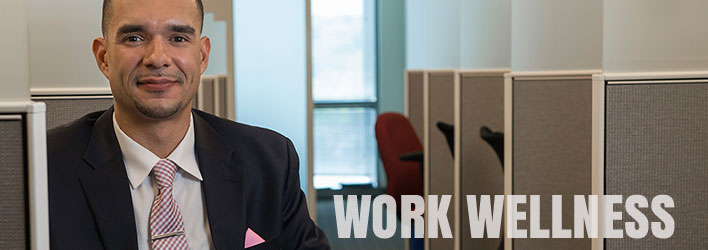Survivor story

Young, strong, and healthy, Carl Nickerson was shocked when his doctor told him that he had testicular cancer. He worked as a freelancer in the accounting field when he was diagnosed. He worked as much as he could during his treatment, and he had an understanding employer. However, there was only so much they could do. As a contractor he lacked many of the safeguards and benefits that other employees enjoy. The financial stress added to the stress of the illness. Like other survivors, Carl made it through his treatment with a new perspective and determination to change things.
He wanted a career, not just a paycheck. He wanted to help others protect themselves from the financial losses that can sometimes follow a cancer diagnosis.
Video: Carl Nickerson: Change in Perspective Leads to New Career
Skip this video Carl Nickerson: Change in Perspective Leads to New Career.Why it is important
For many people, work is a very important part of daily life. It provides a sense of purpose, routine, and of course, a way to pay the bills. Cancer can present many work-life concerns.
Each step of your cancer journey will present different questions to consider. You may wonder how to manage your work along with your care and recovery. In the wake of cancer, priorities sometimes shift and you may begin to think differently about the type of work you do and consider changes.
Improving your work wellness can:
- Help you identify what support you need to be successful at work at each stage of your cancer journey
- Guide you on how to manage relationships with your employer and co-workers
- Assist you in managing your work-life balance
- Help you manage stress from work
- Educate you on what your workplace and healthcare rights are
What you can do
If you are interested in improving your work wellness, here are some tips to follow:
- Think about your physical and emotional health and what you will need to maintain your energy for work, treatment and recovery. This is important if you continue to work during and after active treatment. Fatigue from cancer and treatment can make it difficult to maintain your energy. Side effects of treatment, such as “chemo brain” can impact your ability to perform work as you once did. Knowing when your energy is at its peak during the day, and what your limits are — even if they are only temporary — will help.
- Learn about your employer’s policies on health insurance, sick leave and other benefits that can help you with your health and healing. If possible, ease back into work. Some employers have special programs to help cancer survivors balance their work-life responsibilities. Programs like short- and long-term disability insurance can help you with financial gaps that may occur because of your cancer care. Ask your supervisor or human resources department if there is a work-from-home option, or job-sharing programs that may help you manage the demands of your recovery and work
- Educate yourself about the federal and state laws that help you manage your care needs and provide you with protection from workplace discrimination. The Family Medical Leave Act (FMLA) allows unpaid leave to manage a serious illness that you, or a family member is experiencing. Leave can be taken all at once, or a few days at a time. Talk to your human resources department to see if your company is covered by the FMLA.
The Americans for Disabilities Act (ADA) protects people with problems related to cancer against workplace discrimination. This law allows you ask your employer make reasonable changes to help you perform your work. Find out more about these laws in the “Additional Resources” section below. - Think ahead about what to tell co-workers. If you need help from your employer in managing your care and work, you will need to provide some information about your health. However, for the most part, deciding what to tell co-workers about your diagnosis and treatment is a personal decision.
Questions to ask yourself or your employer
- Do I feel strong enough, physically and emotionally to continue work during and after cancer treatment?
- Should I consider changing my job or career to try something different?
- What benefits or employee assistance programs does my employer offer that can help my wellness before, during and after cancer treatment?
- What reasonable changes can I ask my employer to make to help me do my job, or make going back to work easier?
- Where can I get help with financial difficulties, disability or health insurance questions?
- What are my rights at work under the ADA or FMLA?
- What information will I share with my co-workers and what boundaries will I set?
Question to ask your doctor or care team
- What are your recommendations regarding work? Any limitations?
- If I feel as though I am disabled as a result of cancer or treatment, can you help me find a rehabilitation program or specialist to talk to?
Video: Dawn Lapierre: A Career Change Built Around Wellness
Skip this video Dawn Lapierre: A Career Change Built Around Wellness.Expert voice
Video: Cancer Survivors: Back to Work Considerations
Skip this video Cancer Survivors: Back to Work Considerations.Additional resources
- Working it Out, Your Employment Rights As a Cancer Survivor, a publication from the National Coalition for Cancer Survivorship
- Cancer + Careers, an organization that supports and offers advice to cancer survivors about work
- The New England ADA Center website for information about your rights under the Americans for Disabilities Act
- Massachusetts Department of Family and Medical Leave
- Massachusetts Health Connector website for information on how to obtain health insurance in Massachusetts
- Cancer Survival Toolbox, an award winning, free audio program produced by the National Coalition for Cancer Survivorship, the Oncology Nursing Society, and the National Association of Social Workers
- Cancer Survival Toolbox (En Español)